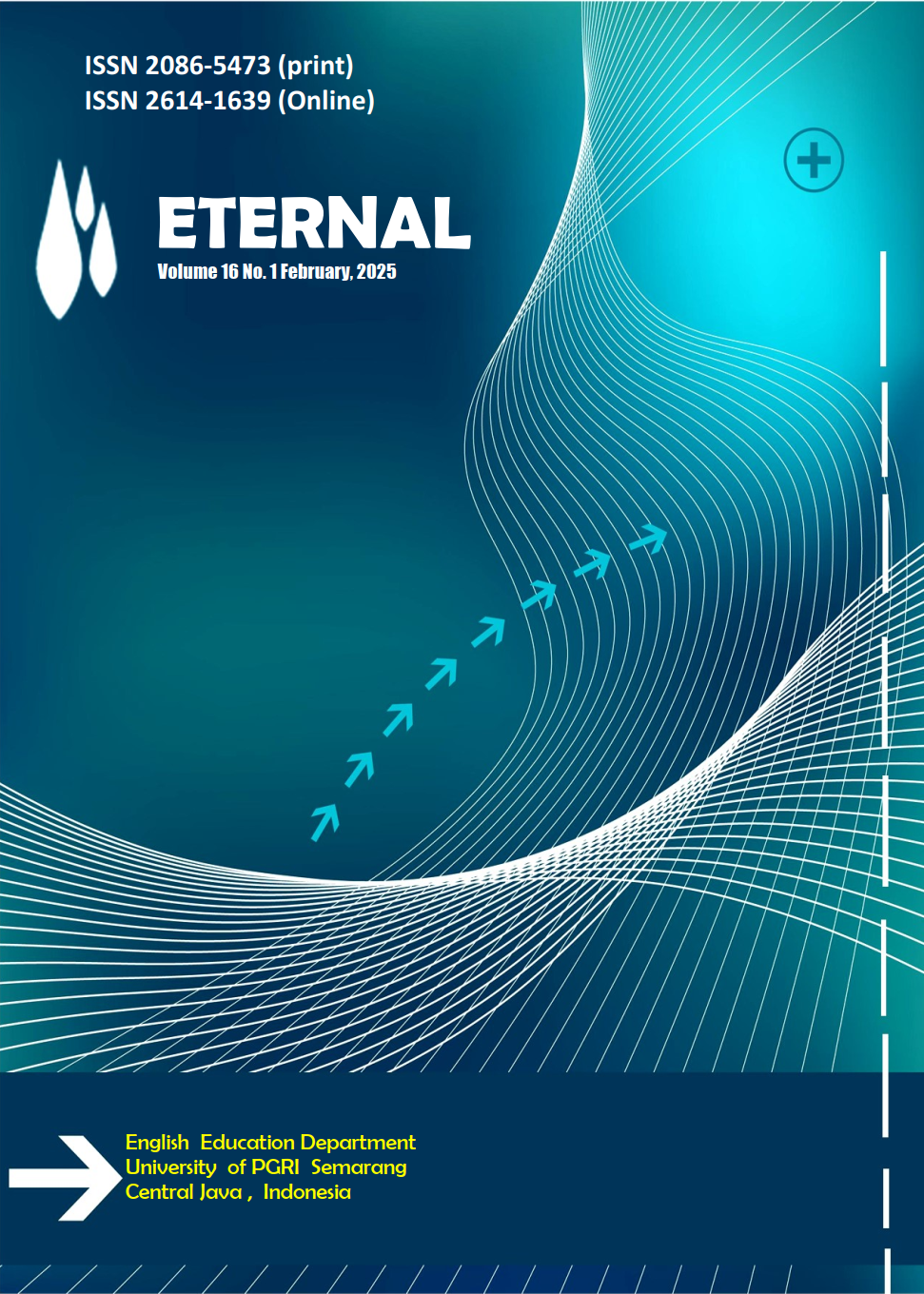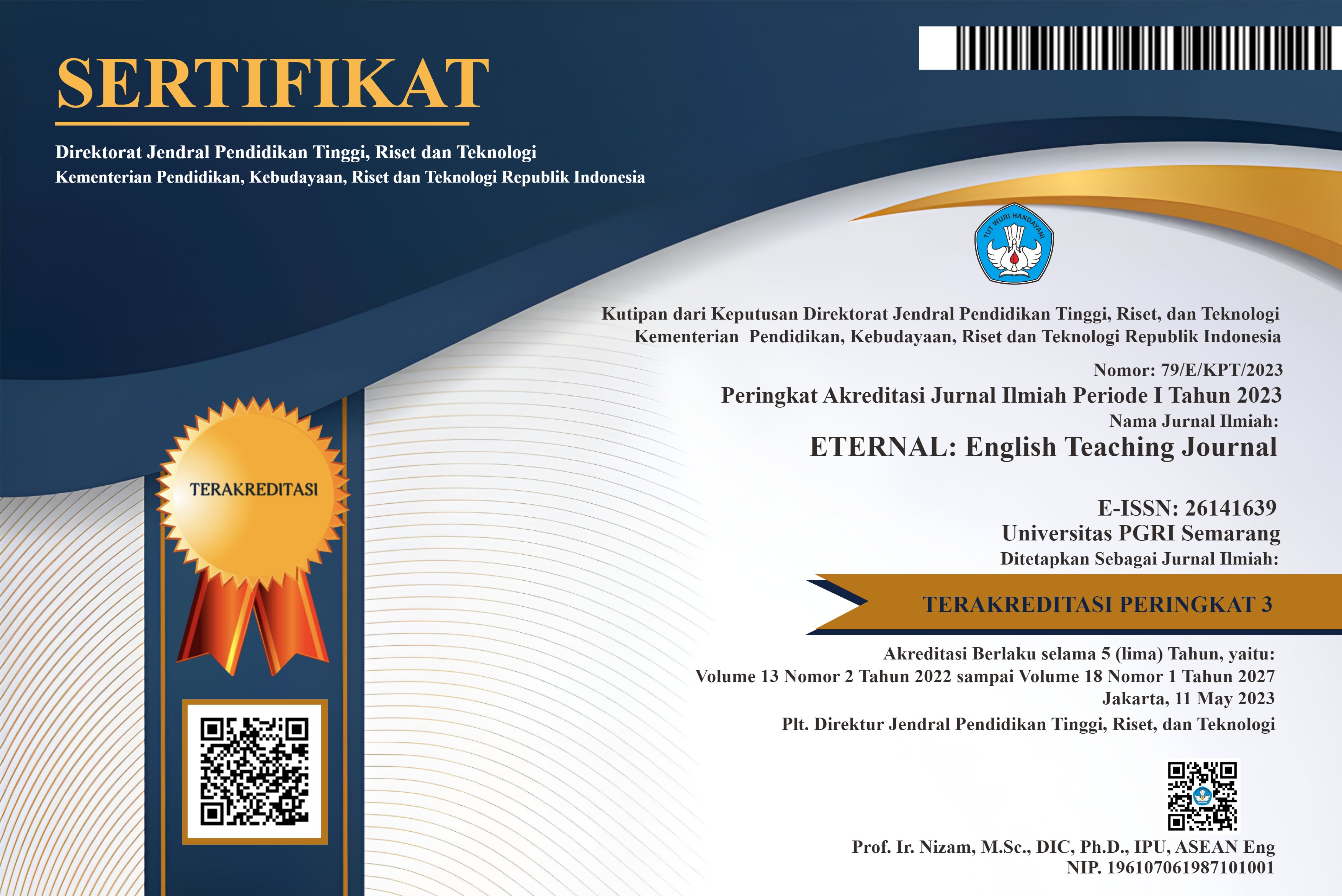Beyond the ‘Uh-Oh’ Moment: Refusal Strategies in a Young EFL Learner’s Extensive Reading Responses
DOI:
https://doi.org/10.26877/eternal.v16i2.1876Keywords:
Extensive Reading, Refusal Strategies, Young EFL LearnerAbstract
Understanding refusal strategies utilized by young learners in learning English as a foreign language (EFL) is essential for teachers to foster more effective interaction in the classroom. The present study explores how a young EFL learner applies refusal strategies when interacting during extensive reading (ER) activities. Data were collected through real-time observations, the learner’s diaries, and a parent interview, and further analyzed using thematic analysis. The findings revealed how the young EFL learner applied more direct refusals, influenced by the learner’s developmental traits. Indirect refusals, which appeared mostly as avoidance, emerged frequently only during the initial ER sessions. Refusals, regardless, did not appear as frequent towards the end of ER sessions as the learner became comfortable and confident with the teacher’s scaffolding. Considering the findings, the current study suggests future studies to investigate how refusal strategies are applied by young EFL learners in a larger group, which may be influenced by different developmental traits, learning situations, and language proficiencies, to further generalize the findings.
References
Aaj, A., Maftoon, P., & Siyyari, M. (2023). Do young EFL learners benefit from task repetition? Language Learning Journal. https://doi.org/10.1080/09571736.2023.2213706
Al-Eryani, A. (2007). Refusal strategies by Yemeni EFL learners. Asian EFL Journal, 9(2), 19–34.
Al-Sallal, R. E. (2024). Pragmatic analysis of refusal strategies in spoken English of Bahraini and Indian L2 learners. Cogent Arts and Humanities, 11(1). https://doi.org/10.1080/23311983.2024.2321682
Azkarai, A., & Oliver, R. (2019). Negative feedback on task repetition: ESL vs. EFL child settings. Language Learning Journal, 47(3), 269–280. https://doi.org/10.1080/09571736.2016.1196385
Beebe, L. M., Takahashi, T., & Uliss-Weltz, R. (1990). Pragmatic transfer in ESL refusals. In R. Scarcella, E. Andersen, & S. Krashen (Eds.), Developing Communicative Competence in a Second Language. Newbury House. https://www.researchgate.net/publication/309352845
Brewster, J., Ellis, G., & Girard, D. (2007). The primary English teacher’s guide. Pearson Elt.
Brown, H. D. (2007). Principles of Language Learning and Teaching (5th ed.). Longman.
Cadierno, T., & Eskildsen, S. W. (2018). The younger, the better?: A usage-based approach to learning and teaching of English in Danish primary schools. European Journal of Applied Linguistics, 6(1), 171–182. https://doi.org/10.1515/eujal-2017-0018
Cahyati, P., & Madya, S. (2019). Teaching English in primary schools: Benefits and challenges. Advances in Social Science, Education and Humanities Research, 326. https://doi.org/https://doi.org/10.2991/iccie-18.2019.68
Chen, Y. (2020). Saying ‘no’ in a foreign language: Efl learners’ elicited refusals. Taiwan Journal of Linguistics, 18(1), 31–67.
Creswell, J. W., & Poth, C. N. (2018). Qualitative inquiry and research design choosing among five approaches (4th ed.). SAGE Publications, Inc.
Khasanah, I. D., Ratnadewi, D., & Yunianti, S. (2021). The study of native Surabaya young people refusal strategy in English. New Language Dimensions Journal of Literature, Linguistics, and Language Teaching, 2(1), 2021. https://doi.org/https://doi.org/10.26740/nld.v2n1.p50-59
Day, R., & Bamford, J. (2002). Top Ten Principles for Teaching Extensive Reading. Reading in a Foreign Language, 14(2).
Day, R. R. (2015). Extending extensive reading. 27(2). http://nflrc.hawaii.edu/rfl
Dwi Puspita, H. (2021). The role of parents in educating children during online classes. ETUDE: Journal of Educational Research, 1(2), 69–75. https://doi.org/10.56724/etude.v1i2.27
Dwiana, N. R., Basthomi, Y., Anugerahwati, M., & Syahri, I. (2021). “I’m afraid I can’t”: Initiating acts on refusal strategy realization. IJELTAL (Indonesian Journal of English Language Teaching and Applied Linguistics), 5(2), 297. https://doi.org/10.21093/ijeltal.v5i2.716
Félix-Brasdefer, J. C. (2006). Linguistic politeness in Mexico: Refusal strategies among male speakers of Mexican Spanish. Journal of Pragmatics, 38(12), 2158–2187. https://doi.org/10.1016/j.pragma.2006.05.004
Firda, I. D. L., Widiati, U., Laksmi, E. D., & Hayati, N. (2018). Attitudes toward extensive reading among English teachers of senior high schools. Jurnal Ilmu Pendidikan, 24(1), 1–9. https://doi.org/http://dx.doi.org/10.17977/um048v24i1p1-9
Fitriyah, F., Dewi, N., Putra, O. P., & Sulistyawati, M. E. S. (2020). Lecturers’ politeness strategies and students’ compliance in English for foreign language (EFL) class. Language Literacy: Journal of Linguistics, Literature, and Language Teaching, 4(1), 75–91. https://doi.org/10.30743/ll.v4i1.2463
García Mayo, M. del P., & Imaz Agirre, A. (2016). Task repetition and its impact on EFL children’s negotiation of meaning strategies and pair dynamics: an exploratory study. Language Learning Journal, 44(4), 451–466. https://doi.org/10.1080/09571736.2016.1185799
Haghighi, H., Jafarigohar, M., Khoshsima, H., & Vahdany, F. (2019). Impact of flipped classroom on EFL learners’ appropriate use of refusal: achievement, participation, perception. Computer Assisted Language Learning, 32(3), 261–293. https://doi.org/10.1080/09588221.2018.1504083
Harimurti, K. F., Suryati, N., & Astuti, U. P. (2021). Students’ perspectives in using XReading as an extensive reading platform for higher education students. JoLLA: Journal of Language, Literature, and Arts, 1(12), 1627–1643. https://doi.org/10.17977/um064v1i122021p1627-1643
Harmer, J. (2007). The practice of English language teaching (4th ed.). Pearson Longman.
Hayati, N. (2024). The analysis of adjunct to refusal expressions in a refusal discourse: A contrastive study between Japanese native speakers and Indonesian Japanese learners. Jurnal Pendidikan Bahasa Jepang, 12(1). https://doi.org/10.15294/chie.v12i1.1515
Jaskow, R. J., & Ellis, M. (2019). Early instructed second language acquisition: Pathways to competence. Multilingual Matters Limited.
Jones, F. R. (1994). The lone language learner: A diary study. System, 22(4), 441–454.
Kasih, L. (2020). Saying “no” in English: Refusal strategies by Indonesian, Chinese, and Libyan EFL learners. Journal of English Teaching and Learning, 9(2).
Kathir, R. (2015). Refusal strategy: Patterns of refusal amongst language academicians at public universities at Malaysia. Proceeding-Kuala Lumpur International Communication, Education, Language and Social Sciences, 1, 180–194.
Kusmaryati, S. E. (2020). Teachers’ perspectives of teaching English to young learners (A descriptive study at primary schools in Kudus). ELT Worldwide, 7(2). https://doi.org/https://doi.org/10.26858/eltww.v7i2.9723
Leung, C. Y. (2002). Extensive reading and language learning: A diary study of a beginning learner of Japanese. Mason & Krashen, 14(1). http://nflrc.hawaii.edu/rfl
Lyutaya, T. (2011). Reading logs: Integrating extensive reading with writing tasks. English Teaching Forum, 1, 26–34. https://files.eric.ed.gov/fulltext/EJ936092.pdf
Mardasari, D. (2020). Various activities in teaching English for young learners. Holistics Journal, 12(1). https://doi.org/https://doi.org/10.4108/eai.11-11-2020.166957
Mutiah, S. D., Nakhriyah, M., HR, N. H., Hidayat, D. N., & Hamid, F. (2020). The readiness of teaching English to young learners in Indonesia. Jurnal Basicedu, 4(4), 1370–1387. https://doi.org/10.31004/basicedu.v4i4.541
Nufus, T. Z. (2018). Teaching English to young learners in Indonesia (pros and cons). English Language in Focus (ELIF), 1, 65–70. https://doi.org/https://doi.org/10.24853/elif.1.1.65-70
Nuzulia, R., & Agustina, P. (2022). English literature students’ pragmatic knowledge: Analysis of strategy and politeness of refusal. SALEE: Study of Applied Linguistics and English Education, 3(2), 296–317. https://doi.org/10.35961/salee.v3i2.486
Park, A. Y. (2020). A comparison of the impact of extensive and intensive reading approaches on the reading attitudes of secondary EFL learners. Studies in Second Language Learning and Teaching, 10(2), 337–358. https://doi.org/10.14746/ssllt.2020.10.2.6
Permataningtyas, W., & Sembodo, T. J. P. (2018). Refusal strategies in two Harry Potter movies. Lexicon: Journal of English Language and Literature, 5(2), 115–126. https://doi.org/https://doi.org/10.22146/lexicon.v5i2.41578
Pinter, A. (2019). Agency and technology-mediated task repetition with young learners Research and implications for primary classroom practice. In Language Teaching for Young Learners (Vol. 1, Issue 2, pp. 139–160). John Benjamins Publishing Company. https://doi.org/10.1075/ltyl.00010.pin
Promluan, Y., & Sukying, A. (2021). The impact of extensive reading on Thai primary school children’s vocabulary knowledge. Journal of Modern Learning Development, 6(5), 209–223.
Qadi, A. H. (2021). Use of refusal strategies among Saudi EFL Students: An investigative study. English Language Teaching, 14(7), 27. https://doi.org/10.5539/elt.v14n7p27
Retnowaty, R. (2018). Refusal strategies by Javanese teachers. RETORIKA: Jurnal Ilmu Bahasa, 4(1), 10–16. https://doi.org/10.22225/jr.4.1.528.10-16
Rhalmi, M. (2019, September 1). Seven characteristics of young learners. My English Pages: Reflection on New Teaching Horizons. Retrieved May, 2024, from https://www.myenglishpages.com/blog/seven-characteristics-of-younglearners/
Riyanti, E. D., & Rahmawati, N. N. (2021). Digital poster project as an assessment in extensive reading class. Beyond Linguistika (Journal of Linguistics and Language Education), 4(1). https://doi.org/http://dx.doi.org/10.36448/bl.v4i1.1976
Rowe, M. L., & Weisleder, A. (2025). Language development in context. In Annual Review of Developmental Psychology (Vol. 23, pp. 201–223). https://doi.org/10.1146/annurev-devpsych-042220
Rusdi, R. P., Purwanti, I. T., & Dahnilsyah, D. (2022). Refusal strategies used by EFL learners of English study program in Riau, Indonesia. IDEAS: Journal on English Language Teaching and Learning, Linguistics and Literature, 10(1), 175–186. https://doi.org/10.24256/ideas.v10i1.2581
Rusminto, N. E., & Ariyani, F. (2022). Linguistic politeness in Indonesia: Refusal strategies among school-aged children in Indonesian context. International Journal of Multicultural and Multireligious Understanding (IJMMU), 9(8), 38–46. https://doi.org/10.18415/ijmmu.v9i8.3904
Stavans, A., & Webman Shafran, R. (2018). The pragmatics of requests and refusals in multilingual settings. International Journal of Multilingualism, 15(2), 149–168. https://doi.org/10.1080/14790718.2017.1338708
Susilowatia, N. E., & Hambali, M. (2022). Politeness speech act of refusing in the speech of boardinghouse member with different first language. ISCE: Journal of Innovative Studies on Character and Education, 6(2), 390–406. http://iscjournal.com/index.php/isce
Varışoğlu, M. C., BAŞUTKU, S., & KAFALİ, Ş. (2023). Refusal strategies of foreign students learning Turkish at B1 level. International Journal of Eurasian Education and Culture, 20, 301–332.
Vygotsky, L. (1978). Mind in society: The development of higher psychological processes. Harvard University Press.
Wagner, C. J. (2020). Seeing and nurturing young children’s reading identities. Journal of Language and Literacy Education, 16.
Wijayanti, M. A. (2017). I’m sorry, I’ve got something to do: A study of EFL learners’ refusal strategies. Journal of English Language and Culture, 6(1), 31–41. https://doi.org/http://dx.doi.org/10.30813/jelc.v6i1.271
Wulyani, A. N., Widiati, U., & Khoiri, N. El. (2022). Challenges in implementing extensive reading (ER) programs: Voices from English teachers at Indonesian secondary schools. Pegem Egitim ve Ogretim Dergisi, 12(1), 74–83. https://doi.org/10.47750/pegegog.12.01.08
Yin, R. K. (2008). Case study research: Design and methods (applied social research methods) (4th ed.). SAGE Publications, Inc.
Yulia, M. F. (2018). Extensive reading for Indonesian university students: An alternative framework for implementation. Journal: A Journal on Language and Language Teaching, 21(2). https://doi.org/10.24071/llt.2018.210210







